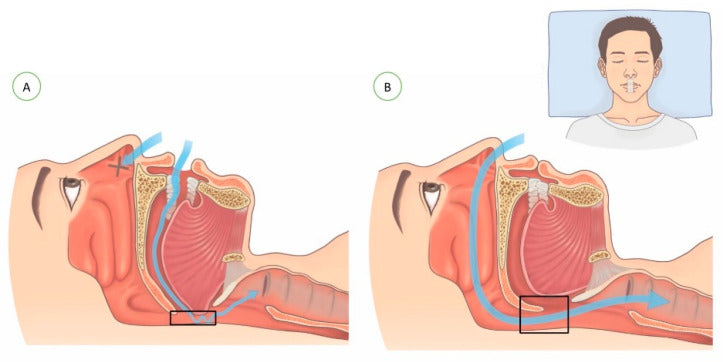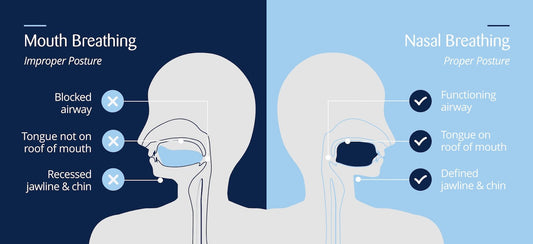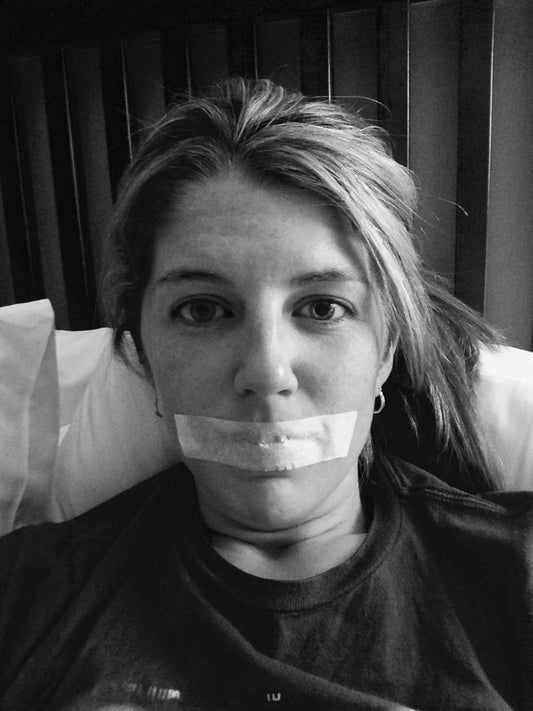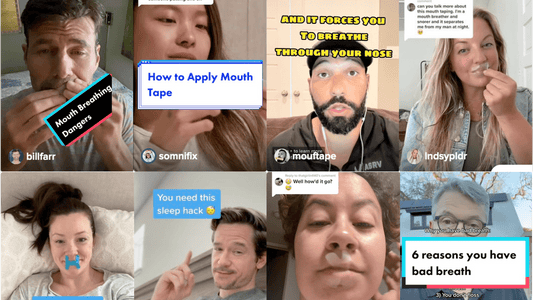Do you or your partner suffer from loud, disruptive snoring and symptoms of sleep apnea? If so, a fascinating new study offers hope that something as simple as mouth taping at night could provide real relief.
Researchers investigated whether sealing the lips with tape to encourage nose breathing could benefit people with mild obstructive sleep apnea (OSA). Results show mouth taping significantly improved several apnea symptoms. Keep reading to learn what sleep apnea is, how the study worked, and what the findings mean.
What is Obstructive Sleep Apnea?
First, let’s quickly review what sleep apnea entails. OSA is a common disorder affecting over 22 million Americans. It occurs when throat and tongue muscles overly relax during sleep, narrowing the airway. This causes loud snoring as air struggles to get through.
The airway can become completely blocked for periods of time, ceasing breathing altogether. This is called an apnea episode. Breathing restarting with a loud snort or choking sound is common. OSA keeps you from entering deep restorative sleep, leaving you tired no matter how long you rest.
OSA ranges from mild to severe based on the number of apnea events per hour of sleep. Side effects include chronic snoring, fatigue, high blood pressure, and increased risk for stroke and heart disease. Treatments like CPAP machines or oral appliances are often prescribed for moderate or severe OSA. But could mouth taping help mild cases?
How the Study Worked
The study recruited 20 participants diagnosed with mild OSA who were identified as mouth breathers during sleep. Each used an at-home sleep testing device on two nights - once with no intervention and again with mouth taping applied. Key measurements were then compared between the two test nights.
Researchers analyzed the apnea-hypopnea index (AHI), which measures apnea episodes per hour. They also looked at blood oxygen levels, snoring frequency, and positional apnea which occurs when sleeping on your back. Would simply sealing the mouth improve OSA symptoms?
Notable Study Results
Some impressive findings emerged when taping the participants’ mouths shut for sleep:
- AHI (apnea episodes per hour) decreased by 47% with taping
- Loud snoring events dropped by 47%
- Blood oxygen levels improved by over one-third
- Positional apnea (while lying on back) decreased by 59%
No negative side effects from mouth taping were reported. Considering how minimally invasive mouth taping is, these results seem very promising.
What the Findings Suggest
Based on the significant improvement to apnea and snoring frequencies, the study authors conclude mouth taping has real potential to help many with mild OSA. They estimate over half of those with mild cases could benefit, especially habitual mouth breathers.
By encouraging nose breathing, mouth taping may reduce or delay the need for more invasive OSA treatments like CPAP machines or oral devices. It could provide a simple first step to try improving mild sleep apnea symptoms before pursuing more aggressive options.
The takeaway is that properly taping the mouth at night may substantially decrease both snoring volume and episodes of sleep disrupted breathing. This benefits not only the snorer but their sleep partner too. More research is still warranted, but findings thus far are promising.
Ready to Breathe Easier Overnight?
If you or your partner notice frequent snoring or symptoms of mild OSA, consider giving mouth taping a try before bedtime. Ensure you use breathable medical tape such as the SomaBody's Mouthtape and keep the lips moisturized. Adjusting to nose breathing may take some time.
But with routine use, you may wake up to reduced snoring and fewer apnea events. Be sure to share this news with any snoring partners or friends who could benefit! Peaceful, uninterrupted sleep may be just a strip of tape away.




